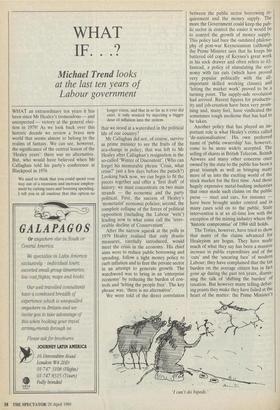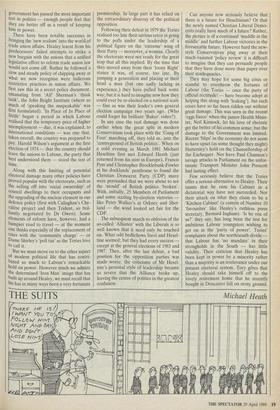WHAT IF. . .?
Michael Trend looks at the last ten years of Labour government WHAT an extraordinary ten years it has been since Mr Healey's tremendous — and unexpected — victory at the general elec- tion in 1979! As we look back over this historic decade we review a brave new world that seems almost to belong to the realms of fantasy. We can see, however, the significance of the central lesson of the 'Healey years': there was no alternative. But, who would have believed when Mr Callaghan told his party's conference at Blackpool in 1976
We used to think that you could spend your way out of a recession and increase employ- ment by cutting taxes and boosting spending. I tell you in all candour that this option no longer exists, and that in so far as it ever did exist, it only worked by injecting a bigger dose of inflation into the system.
that we stood at a watershed in the political life of our country?
Mr Callaghan did not, of course, survive as prime minister to see the fruits of the sea-change in policy; that was left to Mr Healey after Callaghan's resignation in the so-called 'Winter of Discontent'. (Who can forget his memorable phrase `Crisis, what crisis?' just a few days before the putsch?) Looking back now, we can begin to fit the pieces together and offer a 'first draft' of history: we must concentrate on two main strands — the economic and the party political. First, the success of Healey's 'monetarist' economic policies; second, the complete collapse of the forces of political opposition (including the Labour 'wets') leading now to what some call the 'irrev- ersible decline of Conservatism'.
After the narrow squeak at the polls in 1979 Healey realised that only drastic measures, carefully introduced, would meet the crisis in the economy. His chief aims were to reduce public borrowing and spending, follow a tight money policy to curb inflation and to free the private sector in an attempt to generate growth. The watchword was to bring in an 'enterprise economy' by reducing the burden of con- trols and 'letting the people free'. The key phrase was, 'there is no alternative'.
We were told of the direct correlation between the public sector borrowing re- quirement and the money supply. The more the Government could keep the pub- lic sector in control the easier it would be to control the growth of money supply. This policy laid bare the outdated philoso- phy of post-war Keynesianism (although the Prime Minister says that he keeps his battered old copy of Keynes's great work in his sock drawer and often refers to it). Instead, a policy of stimulating the eco- nomy with tax cuts (which have proved very popular politically with the all- important skilled working classes) and 'letting the market work' proved to be a turning point. The supply-side revolution had arrived. Recent figures for productiv- ity and job-creation have been very prom- ising and, many feel, have vindicated the sometimes tough medicine that has had to be taken.
Another policy that has played an im- portant role is what Healey's critics called 'de-nationalisation'. His own preferred name of 'public ownership' has, however, come to be more widely accepted. The selling of shares in British Telecom, British Airways and many other concerns once owned by the state to the public has been a great triumph as well as bringing many more of us into the exciting world of the stock market for the first time. And those hugely expensive metal-bashing industries that once made such claims on the public purse — steel and cars, for instance — have been brought under control and in many cases sold on to the public. State intervention is at an all-time low with the exception of the mining industry where the 'historic compromise' of 1984 still holds.
The Tories, however, have tried to shoVV that many of the claims advanced for Healeyism are bogus. They have made much of what they say has been a massive increase in public expenditure and of the 'cuts' and the 'uncaring face' of modern Labour; they have complained that the tax burden on the average citizen has in fact gone up during the past ten years, dismis- sing the talk of 'shifting the burden' of taxation. But however many telling debat- ing points they make they have failed at the heart of the matter: the Prime Minister's '1 can't do bipeds.' government has passed the most important test in politics — enough people feel that they are better off as a result of keeping him in power.
There have been notable successes in bringing the 'new realism' into the worla.of trade union affairs. Healey learnt from his predecessors' failed attempts to strike a new bargain with the unions that a unified legislative effort to reform trade union law would not come off. Rather he followed a slow and steady policy of chipping away at What we now recognise were ludicrous restrictive practices in union affairs. We first saw this in a secret policy document, emanating from 'Alf Sherman's 'think tank', the John Bright Institute (where so much of 'speaking the unspeakable' was first formulated). 'In Place of In Place of Strife' began a period in which Labour realised that the temporary price of higher unemployment — due, it was explained, to international conditions — was one that, taken overall, the country was prepared to Pay. Harold Wilson's argument at the first election of 1974 — that the country should leave the unions to Labour, the party that best understood them — stood the test of time.
Along with this limiting of potential electoral damage many other policies have Proved popular with the electorate, such as the selling off into 'social ownership' of council dwellings to their occupants and the upgrading of the nuclear element in our defence policy (first with Callaghan's Che- valine project and then Trident, so bril- liantly negotiated by Dr Owen). Some elements of reform have, however, had a bumpier road to travel — at the moment one thinks especially of the replacement of rates with the 'community charge' — or Dame Shirley's 'poll tax' as the Tories love to call it.
But we must move on to the other aspect of modern political life that has contri- buted so much to Labour's remarkable hold on power. However much we admire the determined 'Iron Man' image that has built up around Healey, we must recall that his has in many ways been a very fortunate premiership. In large part it has relied on the extraordinary disarray of the political opposition.
Following their defeat in 1979 the Tories realised too late their serious error in going to the polls under the leadership of a political figure on the 'extreme' wing of their Party — moreover, a woman. Clearly the electorate were not ready for the great leap that all this implied. By the time that they moved away from their 'loony Right' stance it was, of course, too late. By jumping a generation and placing at their head a man (but one sadly lacking in experience,) they have pulled back some way; but it is hard to imagine now how they could ever be re-elected on a national scale — fine as was their leader's own general election campaign two years ago. (Who could forget his brilliant 'Baker' video?) In any case the real damage was done earlier when the great split in modern Conservatism took place with the 'Gang of Four' marching off, they told us, into the `centreground of British politics'. When on a cold evening in March 1981 Michael Heseltine first met Edward Heath (just returned from his stint in Europe), Francis Pym and Christopher Brocklebank-Fowler at his docklands' penthouse to found the Christian Democrat Party (CDP) many were persuaded that we were about to see the 'mould' of British politics 'broken'. With, initially, 25 Members of Parliament and some sizzling by-election victories — like Peter Walker's at Orkney and Shet- land — the wind looked set fair for the CDP.
The subsequent march to oblivion of the so-called 'Alliance' with the Liberals is so well known that it need only be touched on. What odd bedfellows Steel and Hesel- tine seemed; but they had every success — except at the general elections of 1983 and 1987. Then, after the last defeat, a bad position for the opposition parties was made worse: the criticisms of Mr Hesel- tine's personal style of leadership became so severe that the Alliance broke up, leaving the centre of politics in the greatest confusion. Can anyone now seriously believe that there is a future for Heseltinism? Or that the newly named Christian Liberal Demo- crats really have much of a future? Rather, the picture is of a continued 'muddle in the middle' and further Labour victories in the foreseeable future. However hard the new- style Conservatives plug away at their much-vaunted 'policy review' it is difficult to imagine that they can persuade people that they have done more than paper over their inadequacies.
They may hope for some big crisis or scandal to overthrow the fortunes of Labour (the Tories — once the party of official rectitude! — have become adept at helping this along with 'leaking), but such crises have so far been ridden out without great damage. This was seen in the recent 'eggs fiasco' when the junior Health Minis- ter, Neil Kinnock, let his love of rhetoric get the better of his common sense; but the damage to the Government was limited. Recent 'blips' in the economy do not seem to have upset (as some thought they might) Hattersley's hold on the Chancellorship of the Exchequer. Nor have Paul Channon's savage attacks in Parliament on the unfor- tunate Transport Minister John Prescott had lasting effect.
Few seriously believe that the Tories offer a serious alternative to Healey. Their taunts that he runs his Cabinet in a dictatorial way have not succeeded. Nor their attack on what they claim to be a 'Kitchen Cabinet' (a coterie of Number 10 `favourites' like Healey's ruthless press secretary, Bernard Ingham). 'Is he one of us?' they say, has long been the test for ambitious Labour youngsters wishing to get on in the 'party of power'. Tories' complaints about the north/south divide — that Labour has `no mandate' in their strongholds in the South — has little validity. Their criticism that Healey has been kept in power by a minority rather than a majority is an irrelevance under our present electoral system. Tory gibes that Healey should take himself off to the lovely retirement home that he recently bought in Doncaster fall on stony ground.



















































 Previous page
Previous page